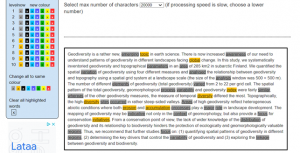The time has come to take a quick review on the work I have put into this course. In this post I will repost my plan and describe below what I have done and show what is left to be done.
10 h administrative work – done mostly, I will also have the second counselling session which I include into the administrative work.
10 hours of academic reading – Mostly done through the academic reading support group. I have read articles about geodiversity, whalesharks and spatial modelling as well as the support groups articles and texts about academic reading. I have now used 7 hours of work of this section so I have 3 hours left.
5 hours academic writing -> 10 hours – I have already used the hours assigned for academic writing, but as my essay for the academic writing support group still needs work, I will assign 5 more hours into this and take it from support groups.
20 hours support groups + blog -> 15 hours – I have used about 5 hours of time getting to know the subjects and the tasks in my support groups which are outside of the actual academic reading and writing tasks. I will also add to this bit the blog drafting and writing. I make notes during the week and then write full posts separately, where I describe how I found the learning in a broad way.
5 hours social learning with friends – I used two hours playing games with exchange students and just last Tuesday an hour with a traveller from Romania I met in Helsinki. We had a very interesting chat about policies, politics and global issues. Altogether I have 2 hours left of this.
10 hours of reading – I have not yet started to read a book in English, this is yet to be done.
10 hours of watching related documentaries – I have spent 3 hours watching a documentary series about world’s rivers. The documentary is in Yle Areena and it is made by BBC in English. I am watching it without subtitles. An other documentary I’ve watched is also produced by BBC and it’s one with David Attenborough. It is about why animals sing, something to do with behavioral ecology. I have 6 hours left to watch documentaries.
10 hours of learning vocabulary -science and geography especially – This one is difficult to put into time, as I have been keeping lists of vocabulary learned and formed it into an excel sheet to keep track and revisit the words I have learned. I think by now it would be about 2 hours of work, so 8 hours left.
10 hours of movies and TV (no subtitles) – I am sure to have fulfilled this already, as I have been watching Outlander in Netflix for 4 seasons now. They use lots of old English and it is very interesting to follow the language as the show contains Scottish and English accents as well as American ones.
10 hours of grammar learning tasks – I have not yet done grammar learning tasks, but I will look into it later.
8 hours of reading news in English – I have taken a habit of reading main news in English every morning, but it is about 10-20 minutes only daily. I think the 8 hours will be full by the time the next period is over as this is a continuous task.
To put it together I have now used about 44-48 hours, depending on how it is calculated. I am ready for the second counselling and some more challenges to learn from. Especially because I have also booked the official IELTS English exam, which I need to pass well for my upcoming exchange semester in New Zealand.
